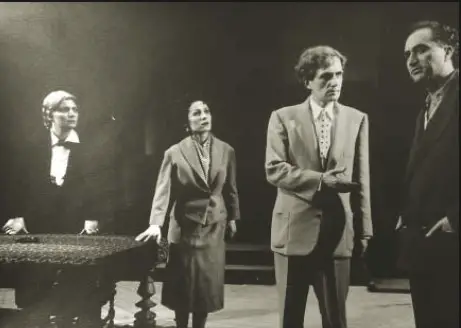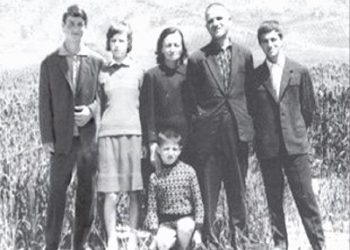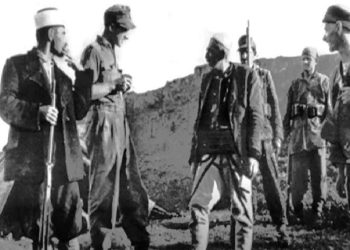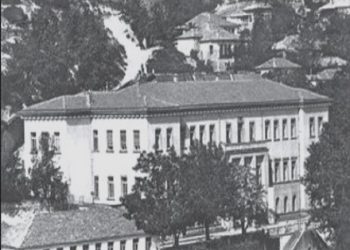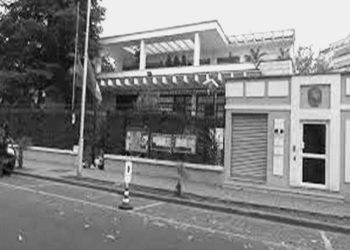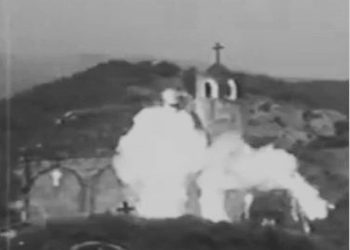Dashnor Kaloçi
Memorie.al publishes some unknown documents issued by the Central State Archive in Tirana (fund of the former Central Committee of the ALP), which belong to the month of December 1974, where the Deputy Minister of Education and Culture Mantho Bala, through an information report sent to the Central Committee of the ALP, for Ramiz Alia, entitled “On some dramatic works with ideological concerns, which were prevented from being staged in our theaters”, he informs about the works of some famous authors and playwrights, such as: Loni Papa, Namik Dokle, Spiro Urumi, Ramiz Lika, Mexhit Prençi, etc. Full information of Deputy Minister Mantho Bala, regarding the “ideological and artistic flaws” that the authors in question had shown in their works, which, according to him, were prevented in time from being staged in theaters, such as was the drama “The Last Fist” by Namik Dokles, which had begun to be staged at the theater “Migjeni” in Shkodra!
The great ‘storm’ and the savage repression that began in the beginning of 1973 against writers and artists as well as all cultural and artistic institutions (initially in Tirana and then throughout the country), after Enver Hoxha’s speech held on January 9, that year in the apparatus of the Presidium of the People’s Assembly, where he spoke for the first time about the 11th Song Festival on the Albanian Radio and Television, accusing Todi Lubonja as general director of that important propaganda institution, as well as Fadil Paçrami, the secretary of the Tirana District Party Committee covering art and culture, seemed unlikely to stop and would continue uninterrupted until the end of that year.
Among other things, this is made known by these archival documents that we are publishing in this chapter of this book, which belong to December 1973, where the Deputy Minister of Education and Culture, then Mantho Bala, informs the leadership of senior of the ALP and personally Ramiz Alina, (secretary of the Central Committee covering, propaganda and art and culture), regarding some problems of ideo-artistic character that had appeared in the repertoire of some theaters and professional stages of major cities and more large of the country.
As we will see in the documents in question, the analysis made by the Deputy Minister of Culture of some theatrical plays in the genre of drama and comedy, by well-known authors such as: Namik Dokle, Spiro Urumi, Loni Papa, Ramiz Lika and Mexhit Prençi, precedes an official letter from Jakup Matos, (then instructor in the apparatus of the Central Committee of the ALP for Arts and Culture), where, among other things, the senior leadership is informed about the dramas that would be reworked and submitted within it year.
But unlike many other documents of this time period and that we have published in other chapters of this book, Ramiz Alia has not made notes on them, but only put his signature, which shows that the document has been seen by him.
Perhaps this also most likely came from the names of the playwrights mentioned in the document in question, as they were not considered problematic in their creativity.
But even from this fact, theatrical works in the genre of drama or comedy that they have presented, their performances have been stopped or suspended, which is also confirmed by these archival documents issued by the fund of the former Central Committee of the ALP , which are published in full just like most of them in this book.
Jakup Matos information report on Ramiz Alia
Comrade Ramiz
To promote creativity in the field of theater, the Writers’ League and the Ministry organized yesterday, (on 21.XII) a meeting with some playwrights. The authors who participated in this meeting pledged concretely for a series of works. Including in this issue the plays that will be reworked within the first 6 months of next year, about 25 plays will be delivered to theaters.
22.XII.1973 Jakup Mato
I N F O R M A T I O N
ON SOME DRAMA WORKS WITH IDEAL CONCERNS, WHICH WERE PREVENTED TO BE STAGE IN OUR THEATERS
Despite the improvements that were made this year in the work of theaters in the spirit of implementing the tasks arising from the speeches of Comrade Enver and the 4th Plenum of the Central Committee, we still have weaknesses and shortcomings, especially in providing the repertoire, organizing and strengthening proletarian discipline, increasing the artistic level, etc.
In order to help the theaters closely and to better exercise state control over their activity, during the month of November-December we sent the teams of the Ministry to the 6 theaters (with two we will finish soon). At the same time, we called on the report before the collegium of the Ministry, the heads of the sections and the directors of the theaters of Korça, Durrës and Elbasan for the implementation of the tasks of the 4th plenum of the Central Committee of the Party.
The most acute problem for all theaters is the repertoire, the lack of new pieces. Although many parts were sent to them as a number but they approved a little.
From August to November this year, theaters reviewed about 70 original works (drama and comedy). About 53 works have been created this year, while 17 were completed a year ago but the authors reworked them again on the basis of remarks made by both theaters and publishing houses.
From all this dramatic activity, the theaters chose to stage 7 works. Some authors are reworking them in order to strengthen their content and ideo-artistic level.
During the review, the theaters encountered poor works not realized both from the inside and the artistic form. Among them (in limited numbers) there were also works with ideological concerns, such as the intensification of the conflict, the more artistic actuality and the liberation of some scenes from narratives.
With the review later made by the directorate and the Executive Committee in cooperation with the Party Committee, we discovered the ideological flaws of the drama and canceled the start of work on its staging. These actions were analyzed by the basic organization and the collective of the theater.
It was also a mistake to publish this drama in Nr. 11 of the magazine “Nëndori”. The Party organization in the League of Writers and Artists analyzes the responsibility of the magazine staff and has proposed strict measures to the responsible comrades.
The Political Directorate of the Army has been recommended that the competition notice be collected, the responsibility analyzed and the decision that awarded the work the second prize annulled.
- Drama “The Last Fist” by Namik Dokles. Its shortcomings are of ideo-artistic character. The author dealing with the subject of the National Liberation War has put at the center of the work the figures of Gestapo officers and the implementation of their plan to use the compromise: the exchange of our 5 fellow prisoners with themselves, in case they will captured by partisan forces.
In the nearly 65-page text of the play, the author describes the pressure and psychological blackmail of Gestapo officers against their comrades to break them to show the way across our border. More than once, Gestapo officers take detainees out before being shot, shot them in the head with automatic weapons, and act as a sadist to a pregnant woman.
The drama is built on psychological anxiety, horror and depression. The resistance of the detainees, although not broken, remains passive, as they are handcuffed all the time and before the threat of automatic weapons.
Dealing mainly with these aspects, the author leaves aside the emphasis on the most typical issue, the character of our war, the role of our Party in this war as well as the outstanding contribution of the people to the defeat of the Nazi-fascist forces, relying mainly on the forces Own.
The play was approved by the directorate of the artistic council of the “Migjeni” Theater, but work on staging it had not started. Some partial and mainly artistic remarks were made to the author. The Executive Committee of the district People’s Council had formulated some ideological concerns for him.
With the departure of the team of the Ministry, the work was studied and analyzed in the directorate of the Artistic Council, then remarks were made, self-criticism was made and it was decided that the work should not be staged. Even the author of the work accepts the essential remarks about the drama.
- A month ago, the professional troupe of Shkodra had started working on staging Dionis Bubani’s comedy, “Miku i Namikut”.
In this comedy are noticed some concerns that have to do with the misunderstanding and correct treatment of the contradictions of our inner development, with the character of the typical, and the affirmative role in the peculiarity of this satirical genre. The author’s essential error lies in the fact that he typifies as a negative figure two of the main characters of the comedy: Veliun-director in the central department and, Namikun-director in a socialist economic enterprise of the capital.
Like Veliu and Namik, they do not carry anything positive, but are painted with blacker sides. For example, Namik is given to us as the abuser in his duty. His damages and abuses socialist wealth. In order not to reveal himself, he fired the chief accountant and appointed Veliu’s friend, Sabirena, in his place. This “director” roams the beaches with the state car, rather than staying in the direction of the enterprise.
In addition, the author makes Namik an ultra-modernist poet, whose poems are published on the literary page of the newspaper “Rinia”. In the end, the author seeks to marry Namik to Veliu’s daughter, who has an age difference of more than 20 years.
Even the figure of Veliu, is given too much “murmme”, with his unjust interventions and among other things typifies him as a typical conservative of the intellectual spheres.
All events are closed in Veliu’s house, there is no fight of positive forces, conflicts and contradictions do not get the way of resolution and the perspective remains very vague. The work does not accurately reflect the reality of our days.
For weaknesses in the ideo-artistic content of the comedy, the Ministry team intervened, which organized its discussion. From the discussion it was pointed out how the directorate, the artistic council and the collective were not deepened in the ideo-artistic content of the work. They made self-criticism and decided to stop working. The District Executive Committee also bears responsibility as it has not previously intervened to prevent it.
- Spiro Urumi’s drama “Names Going to the Rock” deals with the emancipation of the girl and the problems of love from liberal positions. Throughout the work, the author deals with the engagement and disengagement of a working girl, with very dark philosophies about happiness, love and family which are completely foreign to our socialist morality.
The girl, after leaving the engineer, enters into a relationship and speeds up her engagement to a hardworking boy. But as soon as the worker realizes that she has been engaged to the engineer, he breaks up with love and leaves her. But the selfish and vindictive engineer incites the worker by blowing his ear that his fiancée is a slutty girl who has passed many people.
The engineer is driven by the instinct that “what made me lose love, and not have happiness, I must suffer so that she too does not enjoy either love or happiness”. Thus the author from scene to scene puts the characters to create a melodrama of their lives, where sighs and groans erupt endlessly.
Although the author in a “deuxesmachina” way seeks a way of resolving the conflict by means of a lightning bolt or the staging of some workers to unravel the intrigue, the work gains nothing and remains a completely perverted staging with liberal contamination. Modernist.
This spectacle was stopped with the intervention of the team of the Ministry after he had escaped the control of the collective of the theater “A. Moisiu” (the collective work had been discussed some time ago but the remarks were of a masterful nature) and the control of the education and culture section.
Even for these ideological concerns, our team organized a special meeting with the participation of the directorate, members of the artistic council, section and with some representatives of the management of the company who had accepted this work. Most of the discussants severely criticized the ideological errors of the work made self-criticism for lack of vigilance, while the author admits that he has done a work with serious ideological errors.
- In the drama “Mud and grass” by Loni Papa is directly and indirectly denied the need for a positive hero and the establishment of conflict between us, even among ourselves by dividing the main hero into three characters. The author tries to create the conviction that evil can be fought not by putting the positive hero face to face, but by doing the autopsy of himself. According to him, all the bad things have come that our society has not done the autopsy properly.
- The drama “More Morana” by Ramiz Lika, completely boosts our reality by putting in the center the figure of an intriguing and arrogant young bayraktar, ostensibly pampered by the people of our power. The whole atmosphere of the transformation of our village is given with the darkest colors. This is a typical case of confusing non-antagonistic conflict with antagonistic conflict.
- While the drama “Friend K. and others” by Mexhit Prençi, is a drama that strongly supports the liberal-bourgeois idea of free love.
The authors presented the last three plays at the publishing house “N. Frashëri ”and in the analysis he made, he called them completely unpublishable.
Based on the conclusions of the collegium of the Ministry and the teams we sent to the district theaters, we thought to organize in January 1974 a seminar with the leading staff of theaters on the problems of security and repertoire content, to further enhance the quality of work , artist norming etc.
These tasks are also related to the 30th anniversary of the liberation of the Homeland. At the beginning of January, in cooperation with the Writers ‘and Artists’ League, we will organize a meeting with all the playwrights of the country where we will raise some problems of the content and artistic level of the works and measures for the future. Together with the friends of the connection we have started direct contacts with the playwrights where we discuss with each one (separately) about the parts that are working and the measures that should be taken to complete them as soon as possible./Memorie.al
Tirana on 19.12.1973
DEPUTY MINISTER
(Mantho Bala)




